Alien Legacy
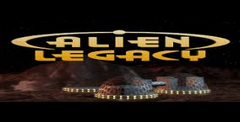
| a game by | Ybarra Productions |
| Platform: | PC (1994) |
| User Rating: | 9.0/10 - 2 votes |
| Rate this game: | |
| See also: | Space Games, Alien Games |
Either sierra have suddenly decided they've been doing it wrong all along by producing twee adventure games, or they've just got into all things galactic extremely big time. Hot on the heels of Outpost - Sierra's classy strategy game that has you building colonies in space - comes Alien Legacy, which has you doing, er, more of the same. Although graphically, there is no comparison between the two (the visuals in Outpost are absolutely stunning), the colony-building element is very strong in both games. Also, they are both all about saving the last remaining people of the earth from extinction. The first thing that will strike you about Alien Legacy, though, is that it's very heavy on the plot-setting. This trend is continued throughout the game and while it goes on and on about the storyline so much that it's often in danger of disappearing up its own rear anatomy, the gist of it is actually quite simple. This then, is what it's all about...
The Big Sleep
You have just woken up from years of cryogenic sleep to resume command of your ship, the United Nations spacecraft. The Calypso. On board this ship, in cryogenic suspension, are thousands of human refugees; survivors of an intergalactic war (Yawn. Now that's really original isn't it?) that tore the Earth apart.
Years after your ship was sent into space, another one, the Tantalus, was launched. The Tantalus is more advanced than your ship, so it should get to the pre-designated waypoint years before you. When you arrive. you can find no trace of the Tantalus or its crew. Your objective then, is to find out what happened to your ill-fated colleagues, and build colonies on planets to ensure mankind's continued existence.
However, to add to your problems, your ship's robot keeps receiving very spooky messages from Earth stating quite clearly that things are going very horribly wrong. The final message is full of stuff like "they are overwhelming us, help!" and "aargh!", which sums it up, really.
Sounds familiar?
Alien Legacy is, first and foremost, a strategy game. Most of your time is spent building colonies and maintaining the resources on them. The building aspect is similar in style to Sim City, but it's not as complex. It's more like the simplistic resource management seen in Dune 2. However, that's not to say it's easy - the more colonies you build, the harder it gets to keep track of what's going on in them all. Fortunately, the mouse-controlled interface is excellent and you can go to any part of the game quickly and without hassle. Also, you're not entirely on your own when it comes to making decisions. You have five advisors at your disposal who will point you in the right direction at crucial points.
Looking for clues
Apart front the resource management side of the game, your main objective is to find out what happened to the Tantalus. As you explore the different planets with your fleet of ships, you constantly pick up clues which help you piece together the information you need to find the Tantalus and its survivors. There's also a combat element to the game, but you have to go way into the game before you find it, and when you do, it's a bit of a disappointment. The graphics for the combat section are the same as those used for the surface exploration part, except there's a few aliens stuck on top of it for you to shoot or drop bombs on - whatever takes your fancy.
On the whole, I found Alien Legacy to be highly addictive. In the later stages of the game, it's a real challenge to keep your colonies ticking over and maintain a steady balance of resources in each one. The whole thing seems a bit daunting when you first start, but if you stick with it for an hour or two, you'll find an engrossing and addictive strategy game with a decent plot to boot.
Colonial Management
To put a very involved process as simply as I can. this is how you go about building and maintaining colonies in Alien Legacy. There are six basic resources you need to start a colony. You need ore for building materials, energy to supply power to your buildings, life support for food and water etc., science resources to help you develop new technologies, humans for personnel, and robots for constructing installations and piloting your ships. Once you've got a few buildings up and running. your colony starts producing these essentials itself and gives you room to concentrate on the other aspects of the game. If you run low on materials, you can get them yourself by going to the surface exploration screen and hunting around the planets until you find them.
As the game progresses, your scientists will invent new items which make your installations and ships more efficient. Your factories become more advanced, your power plants produce energy quicker, your ships go faster and get better weapons and so on. It all sounds more complicated than it is. After a while, designing profitable colonies becomes second nature. It's keeping them going that's the problem.
Download Alien Legacy

System requirements:
- PC compatible
- Operating systems: Windows 10/Windows 8/Windows 7/2000/Vista/WinXP
Game Reviews
Looks aren't everything. Just ask Quasimodo. Some of the best things in life look pretty terrible when you first come across them. Think about a bowl of mushy Weetabix, all mashed up with milk and lashings of granulated sugar. It looks like a load of unappealing slop -whereas when you actually start eating it, it tastes like manna from Heaven (to me, at any rate).
I'm only mentioning this because when I first received the preview copy of Alien Legacy, I thought it looked a bit... well, dull. The graphics seemed a bit strange, ranging from the slightly impressive to the determinedly average. The last sci-fi related game I'd played was TIE Fighter, so Alien Legacy's methodical pace and screens of text seemed like a mouthful of cold dog phlegm after that gigantic banquet of action-packed canard en croute.
Furthermore, being the impatient, 30-second attention-spanned goon that I am, I initially decided to skip the traditional manual-perusal ceremony and plough straight into the game unaided by such tiresome things as preparation, understanding, and a general clue as to just what the hell I was supposed to be doing.
Fools rush in
So, there I sat, hunched before the monitor, squinting at the screen and gingerly clicking the mouse like a curious chimpanzee that has just been handed a computer and is trying to work out which button dispenses the bananas.
Frustrated by my lack of knowledge, and egged on by a friend who was standing over me thirsty for a game with some action, I eventually admitted defeat and jumped back into the cold hard void that is Microsoft's Disk Operating System, ready to boot up TIE Fighter yet a-bloody-gain. The long and short of it was that I was dreading writing this preview.
Then I started getting curious. As I lay in bed, a few thoughts sprang to mind: Didn't I have the same problem with Sim City the first time I played it? And hadn't Alien Legacy's install program warned me that I needed 21Mb of free hard disk space? There must be something big at work there. Mustn't there? And was I really the sort of sad sack who lies awake at night worrying about a computer game?
So, the following day, I did the right thing. I read the manual. I followed the tutorial. I thought hard about what I was doing. I got into it. And, verily, I saw that it was good.
Depth charge
The story behind Alien Legacy runs roughly as follows. Miraculously, the human race managed to make it into the 21st Century without blowing everything up with bombs. We'd even got round to exploring our solar system properly, establishing a few colonies out in the asteroid belts to create a little breathing room back here on our overpopulated planet (let's hope they sent Tory voters up first - we could quite happily do without them). Unfortunately, being the brutal berks we are, we soon got caught up in our own little feuds and fights, and spent most of our time kicking each other's arses rather than continuing to delve deeper into space travel. Cuh! Typical.
Anyway, all this in-fighting would no doubt have continued until we brought about a Planet of the Apes-style ending for ourselves, had it not been for the events which occured in 2043, when a bunch of cheeky aliens from Alpha Centauri suddenly turned up and started dropping horrible viral weapons on us. Flesheating necro-stropocroppolis ahoy!
In a panic, we all came together as one (steady - Ed.) in order to save our inherently cowardly selves. The United Nations took control of the Earth, and top-notch scientists worked round the clock to invent new cool stuff for us to use against the Alien Bosch.
So there we were, constructing huge space battleships and laser beams and things. At the same time, as an insurance policy, we built gigantic "seedships" -immense star cruisers which held thousands of humans in suspended animation, designed to seek out faraway planets and colonise them, thereby ensuring the survival of the human race.
And guess what? You're in charge of one of them. The uns Calypso, to be precise. At the start of the game you've just been reanimated, orbiting a suitably inhabitable planet, light years away from Earth.
But then comes the twist. While you were asleep, your interstellar answerphone continued to receive messages from the United Nations back on Earth. When you come to, you discover that 17 years after you departed, the un launched another seedship, the Tantalus, on course for the same solar system as you. And because technology had progressed while you were snoozing in your cryogenic chamber, the Tantalus' engines were more efficient than yours, so it should have arrived some 21 years ahead of you, and begun building colonies ready for your arrival.
So where is it? Who knows? It's all quite eerie. And you can't get on the phone to Earth because Earth isn't there any more. The final transmission from the un consisted mainly of shouts and screams. It's time to stare into space, gulp a little and realise that you are truly on your own.
Only you can save mankind
There's so much going on in Alien Legacy that it's hard to know where to start. There's Sim City-style colony building, Star Control-style exploration (both of planet surfaces and space itself). Civilization-like research (you need to develop new technologies constantly), and a nice Twilight Zone-esque plot as you search for clues on the fate of the Tantalus, and the rest of the human race. Put this together with the resource-management of Dune 2 (Yeah, okay Charlie, so you've got a big game collection! -Ed), and you've got some idea of how big and varied this game is. Luckily, you're provided with a Personal Data Assistant, or pda, which contains oodles of information about this, that and the other, and records all the important information as you uncover it. You've also got a team of advisors, each of whom will nag you constantly and help point you in the right direction. Everything is controlled by a simple point-and-click mouse-and-menu interface which soon becomes second nature.
Let's break the game down and pick the various elements apart shall we? It should give you at least some idea of how much is going on here.
Colonies
Your main objective as the captain of the Calypso is to ensure the survival of the human species. So, hey, you'd better build some places to live.
Initially, you'll need little more than a few living quarters, a power station and a factory. Factories are crucial to your survival, since they can both act as mines (natural resources become scarce very quickly), and as manufacturers of essential items such as robots, spacecraft and weaponry. You'll also want to bung in a few research labs here and there, each of which can be assigned to a different project - from new medicines to protect the human body, to designing new bombs to blow it to pieces.
Building colonies is fairly simple: send a craft down to the planet's surface, find a suitable location and get some robots to lay down the foundations. If you've got enough building materials you can start straightaway by simply selecting the type of building you want, and placing it down with the mouse.
The tricky part is keeping a colony going. Not only will a lack of just one type of resource cause the whole thing to break down, you may also find yourself coming under attack from hostile natives (my first base was attacked by a giant fungus), or dealing with a revolution from within your own base.
As you progress, you'll have to manage many of these colonies, often on different planets, all at the same time. Resources will often have to be shuttled from base to base -for example, a colony built on a gigantic mountain of tin, for instance, will be able to manufacture as many Tonka toys as it wants, but may have trouble finding sources of energy. So you'll want to exchange some of that tin with your base in the middle of that big forest, which is surrounded by energy-providing trees but hasn't got enough tin to make a ringpull, let alone a new power station. This means that should you neglect just one of your bases, the whole self-sustaining environment could come crashing down around your ears, causing the extinction of the entire human species. And it would all be your fault, just because you weren't paying enough attention. Doh!
Exploration
There's not much point in travelling all that distance from Earth and then deciding to settle on just one measly planet now, is there? There are loads of planets and asteroids all around you - use 'em, you idiot. Another of your main tasks is to explore, and learn from what you discover.
You start the game with four space vehicles, piloted by robots, which can be used for a variety of purposes. There's the shuttling back and forth of resources and crew for one, which is essential, but more excitingly, they can also be used for deep space travel, and planet surface exploration missions.
Using the handy solar system map -which is an impressive 3D model which you can spin around and zoom in and out on -you can choose a planet which looks interesting and designate a ship to travel there (provided it has enough fuel to do so). Your probes can then uncover its vital statistics - so you can tell whether it's habitable or not.
Next, you send a craft down for surface exploration. Here you get to pilot your ship across a fractally-generated landscape and collect resources, discover things (any new phenomena you discover provides your scientific research teams with both ideas and knowledge which can be put to good use when inventing equipment), and generally have a good nose around. It's always a peaceful affair, however, so your craft is also equipped with laser beams and bloody great big bombs in case anything nasty rears its head.
This whole segment is very similar in concept to the planet exploration sequences in Star Control 2, except here it's all in 3D, and there are more interesting things to find.
Your ships must also establish space stations. These are absolutely critical to your success, since not only can each one hold its own colony, but it also acts as a handy Granada motorway service station in space, allowing your exploratory craft probing the outer reaches of the solar system a chance to refuel and rest. Unlike motorway service stations, however, they don't have any of those horrible plastic tree-houses for the kids outside, and there's no sign of those racks of $1.99 tapes of Val Doonican or James Last. Which can only be a good thing.
Oh yes, and while you're about it, why not come over all Nancy Drew and start looking around the solar system for some clues? You want to know what happened to that other ship, don't you? Especially if it was something nasty. Best to know what's going on, eh?
Research
If there's one thing we humans are good at, apart from wrecking things and starting religions, it's inventing stuff which makes our lives easier. From the wheel to the remote control unit, everything we've ever made is designed to appeal to our lazy, sloblike instincts. It's only natural that you should want to rustle up some new gadgets to aid your survival in space, and in Alien Legacy you do this with help from your scientific research team. The Technology Manager screen enables you to decide which kind of projects your people should be working on; from electronic devices to biological engineering. Success depends largely on how much new knowledge you can acquire during your sojourns around the planets. Discovering a new type of plant life, for instance, could enable your biologists to produce a life-saving serum.
The beauty of researching and constructing is that you, as a player, really feel like you're getting somewhere - and since new technology depends on the gathering of knowledge, it makes you want to get out there and really e-x-p-l-o-r-e.
The bigger, the better
Like I said, there's a whole heap of stuff going on here: planning, management, research, exploration, and last, but by no means least, that all-important element - a storyline. I wish I'd had more time to play with the preview copy I was given, but then again I'd probably only have spoiled it all for you by revealing what happens next. So find out for yourselves.
Alien Legacy seems like the type of game you can really get stuck into, in a lonely, self-fulfilling but ultimately slightly sad sort of way. There's always something requiring your attention, as you juggle resources and build new facilities, and there's always something around the corner for you to discover, as you feel your way out into the further reaches of space. The amount of detail is quite phenomenal.
It may not look as pretty as say. Theme Park, but if it's a thoughtful blend of strategy and mystery you're after, then Alien Legacy looks as if it could be a fair bet. Let's just hope that developer Dynamix tidies up a few of the ropier elements which initially put me off the game slightly (such as the none-too-well-drawn main bridge and the jerky cinematic intro), so that similarly-minded buffoons won't have any reservations about diving in and playing the thing to death.
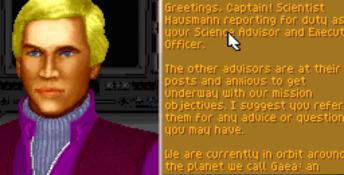
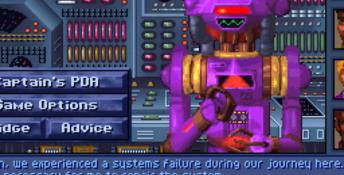
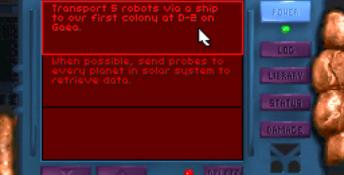
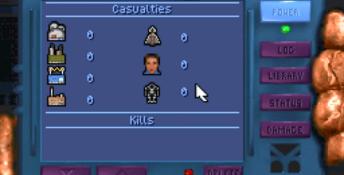

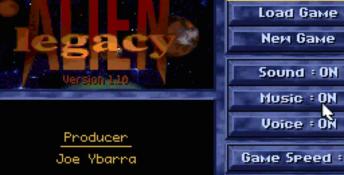
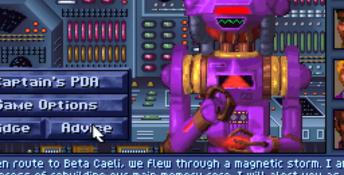
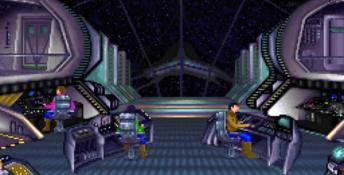
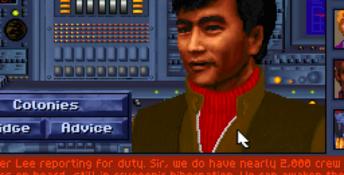
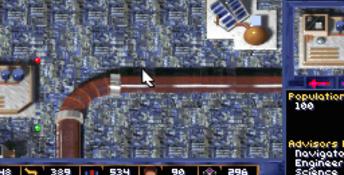
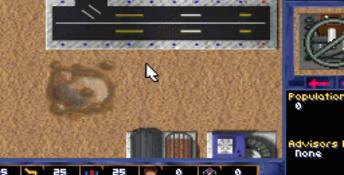
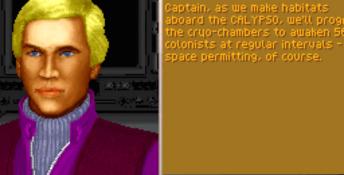
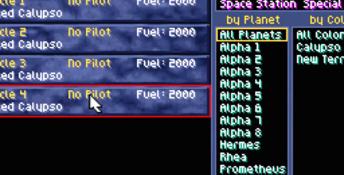
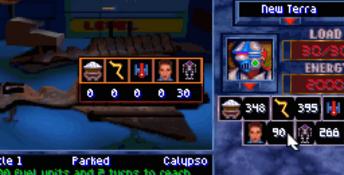
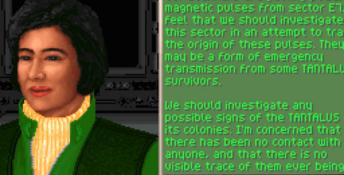
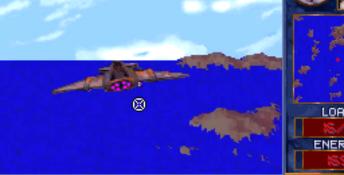

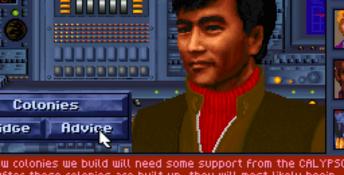
 Apollo 18
Apollo 18
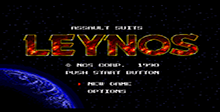 Assault Suits Leynoss
Assault Suits Leynoss
 Elite
Elite
 Frontier: Elite II
Frontier: Elite II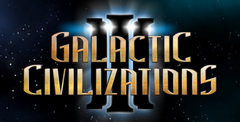 Galactic Civilizations
Galactic Civilizations
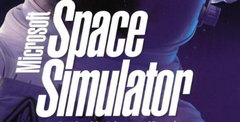 Microsoft Space Simulator
Microsoft Space Simulator
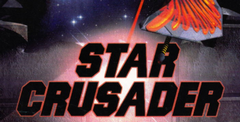 Star Crusader
Star Crusader
 The Last Dynasty
The Last Dynasty